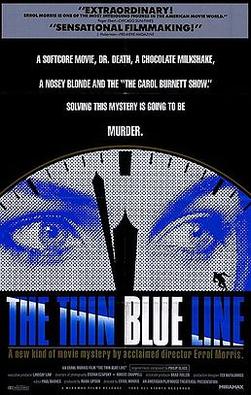
Released: August 25th, 1988
Rated: NR
Studio: Miramax
Starring: Randall Adams, David Harris
Directed by: Errol Morris
Written by: Errol Morris
Personal Bias Alert:
likes crime docs,
understands the flaws in America’s judicial system
7 of 10
After
being released from prison, documentary subject Randall Adams sued director
Errol Morris for the rights to his life story.
He wasn’t going after the money from the film, nor was he making big
plans to cash in on his story. In fact, Adams
lived a relatively obscure life after his release, so much so that despite
being a famously exonerated man, his death in 2010 wasn’t noted
nationally. Speculation over why the
lawsuit came to pass has no clear answer, with Morris stating “it’s a long,
complicated story, but I guess when people are involved, there’s always a mess
somewhere.” It’s too bad that Morris
waited to make this statement until after the film was released, because it
would have made a perfect ending to the muddled story his documentary unfolds.
The
Thin Blue Line investigates the murder of Texas police officer Robert W.
Wood, who was shot and killed during a routine traffic stop in November
1976. Adams would later be convicted of
the killing based on flimsy evidence, and Morris would eventually come across
the case while working on a film about the prosecution psychiatrist nicknamed
Doctor Death. A dogged researcher,
Morris would spend the next two years investigating the case, abandoning the
ostentatiously named doctor in favor of the subdued Adams’ very troubling
story.
Morris
clearly believes that Adams is innocent, and uses his comprehensive
understanding of the case to focus in on where things went wrong. Racism, suckered cops, and fear of outsiders
in small town America only scratches the surface of the complications
surrounding the case, so Morris has plenty of material to cover. To help make this wealth of exposition go
down easy, he employed what was at the time a new technique in documentary
filmmaking: reenactments. This is common now, especially in crime
stories, but at the time it was believed that documentaries shouldn’t stray
from absolute fact. That Morris used
these reenactments to show the different ways the murder might have gone down
only made his technical choice all the more controversial, famously getting the
film rejected by the Oscars for having too much scripted material. But in this case of he said she said,
allowing the viewers to see the way the story slowly changed throughout the
investigation shows how even the small, good-intentioned efforts of law
enforcement officials led this case astray.
Of
course, there were larger and far more harmful blunders throughout the case,
the biggest of which was the absolute reliance on eye-witnesses to tie Adams to
the crime. Eye-witnesses are highly
unreliable even when they have the best intentions, and the group of people who
brought Adams down were far from model citizens. In fact, he never would have been accused in
the first place if then petty thief David Harris hadn’t thrown him under the
bus, claiming that he was in the passenger seat when Adams shot Officer
Wood. Morris returns the favor, arguing
throughout the film that Harris was the actual shooter. The problem is, there’s so many conflicting
sides to the story that even this film’s very slanted version is less than
convincing. There’s simply too many
things that don’t add up, and the heap of complications that Morris throws out
only further confuses the matter. This
uncertainty would be fine if the film was about how the case went wrong and the
reasons why, but in trying to make the case that Adams is innocent and Harris
is guilty, the film ultimately fails.
It
still manages to be rather absorbing, and anytime cases of police misconduct
pop up, I think of this film. It’s very
good at encapsulating how badly investigations can go, and how long the
mistakes can remain hidden away. The
police are just people too, and as Morris said, when there’s people involved,
there’s always a mess somewhere.
Other Notes:
Ø The
judge came off as an unlikable, smug guy, and his chuckle after he tells the
story of what happened to the woman that turned in Dillinger was chilling.
Ø I
love Philip Glass’s score. It sounds
vaguely like Metamorphosis, but I’m unclear if there is really a connection.
Ø Whatever
happened to the milkshake?

No comments:
Post a Comment